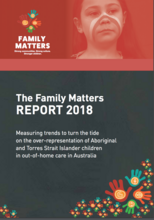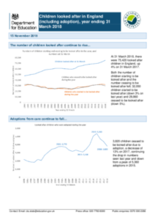Displaying 1051 - 1060 of 2223
The present study examined the effectiveness of Family Group Conferencing (FGC) in child welfare.
Family Matters reports set out what governments are doing to turn the tide on the over-representation of Aboriginal and Torres Strait Islander children in out of-home care, and the outcomes for children and their families.
This statistics publication from the UK Department for Education provides information about looked after children in England for the year ending 31 March 2018.
This paper presents findings on the previous life experiences of an entire cohort of ‘difficult to place’ adoptees who were placed in Australia over 26 years.
This Annie E. Casey Foundation brief, which utilizes the most comprehensive data set ever collected across all 50 states of the US, fills in key details about the lives of young people who have experienced foster care.
This study examined variability in problem behavior among toddlers entering new foster care placements and identified related child and parenting characteristics.
This is an exploratory study focused on open adoptions from foster care conducted through the public child protection agency in New South Wales, Australia.
Utilizing case examples, this discussion paper examines foster care decisions that disrupt important child-caregiver relationships.
This manuscript relies on two studies to learn more about the experience of adolescent-aged foster youth who utilize long-term mental health services coordinated through A Home Within, a national nonprofit committed to reducing treatment barriers by asking licensed therapists to provide pro bono therapy “for as long as it takes.”
This paper discusses two key strategies detailing how “relationship-focused” and “trauma-informed” intervention practices, which form the basis of an Australian therapeutic program called Treatment and Care for Kids (TrACK), made a difference in the lives of highly traumatised children.



